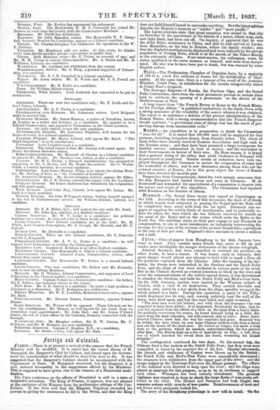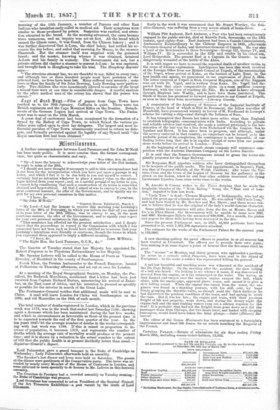fortigu lint Catmint.
PRIM—There is at present a revival of the rumour that the French Ministry will be modified. It is stated that the recent illness of M. Mocquard, the Emperor's Chef du Cabinet, had forced upon the Government the consideration of what should be done if he were to die. It was suggested that the Emperor's Cabinet should be incorporated with the Department of State. M. Moequard recovered, but the Emperor, it is said, listened favourably to the suggestions offered by his Ministers. This is supposed to have given rise to the rumour of a Ministerial modiStation.
The Paris conferenoe on the affairs of Neuchatel is still in a state of suspended animation. The King of Prussia, it appears, was not pleased itt the exclusion of his Minister from the preliminary sittings of the Conference. It has been said that the Emperor Napoleon exceeded his pewers in giving the RSZUTRIICOS he did to the Swiss, and that the King
deers not hdd himself bound to surrender anything. But the latest adices describe his Majesty's humour as "milder" and "more pacific." The Lyons journals state that great sensation was caused in that city on Saturday by the appearance in the streets of a priest, whose nose, ears, and right hand, had been cut ofE On inquiry, it appeared that he was the Abbe Beloc, missionary to China, and that he had arrived at Lyons, from Marseilles, on his way tø Rennes, where his family resides ; also that the frightful mutilations lie displayed had been inflicted by the savage population of Penang Kiou, which is at the mouth of the Tehou Eiang, at the extremity of China. Four missionaries, his colleagues, were, he states, mutilated in the same manner as himself, and were then decapitated. He also was to have been put to death, but was rescued by some English sailors.
i Piedmontese .Chtunber of Deputies have, by a majority of 106 to 4, voted five millions of francs for the fortification of Alexandria. At the same time, there is a rumour Odle recall of the Austeian Minister, Count Paar, in satisfaction for the inaults categorically stated in Count End's despatch.
The Dowager Empress of Russia, the Duchess Olga, and the Grand Duke Constantine, have been the most prominent persona in certain fetes held to celebrate the opening of a promenade on the shores of the Mediterranean at Nice.
A long report from "the French Envoy at Rome to the French Minister for I oreign Affairs" is published exclusively in the Daily Newsy with a strong assurance of the reliability of the source whence it was obtained, The report is in substance a defence of the present administration of the Roman States, with a strong recommendation that the French Emperor should continue "a provisional state of things that haa the merit of preserving Europe from innumerable °vile."
10.1tfli ff.—An expedition is in preparation to finish the Circassian* "once for all." It is stated that 100,000 men will be employed for this purpose, including irregulars drawn from friendly tribes. The chiefs of these tribes have already received Russian decorations and high rank in the Russian army ; and they have been promised a large recompense for faithful service, indemnities in land or money, and the succession to their Governments in favour of their sons. By these means, it is hoped that a general rising of the tribes that yield obedience to Scharayl will be prevented or paralyzed. Similar means of seduction have been employed throughout the Caucasus to secure the coOperation of some and the neutrality of others, and to sow dissension among those who are the avowed enemies of Russia, for to this great object the views of Russia have been directed for mouths past.
Despatches from Constantinople, dated the 14th instant, announce that the ship Kangaroo had landed troops and arms in Cireassia. M. de Boutenieff had demanded the appointment of a commission to inquire into the nature and origin of this expedition. The Cireassians had repulsed 4000 Russians on the frontier of Abuja.
lernmark.—The Sound Dues treaty was signed at Copenhagen on the 14th. According to the terms of this document, the dues of all kinds to which vessels were subjected in passing the Sound and the Belts will be completely done away with from the 1st April. Denmark also engages to suppress for certain kinds of merchandise, and to materially reduce for others the dues which she has hitherto received for transit on the canal of the Eyder and on the routes which unite the Baltic to the North Sea. The mtuitime states on their part engage to pay Denmark as compensation, in one or more instalments, an indemnity representing the average for five years of the revenue of the present Sound dues, capitalized at the rate of four per cent. England's share amounts to about a million and a haLf.
U.—Files of papers from Hongkong to the 30th January have come to hand. They contain many details that serve to fill up and render more intelligible the meagre statements of the electric telegraph. Admiral Seymour had been compelled to contract his position—in other words, to beat a retreat. It was found, early in January, that great danger would attend any attempt to hold with so small a force all the positions captured from the Chinese. After the burning of the factories, the troops were intrenehed in the Gardens and the Dutch Folly Fort, and the ships of war were anchored in various parts of the river. But as the Chinese showed an evident intention to block up the river and sever the communications of the widely-spread forces, it was determined to abandon the Gardens, and hold the Dutch Folly and Bird's-Nest forts, On the 12th January, parties were landed in the Western suburb of Canton, with a view to its destruction. They carried fire-balls and torches, and, aided by a few shells from the ships, speedily wrapped the whole suburb in a blaze. During this operation, a party of the Fifty ninth Regiment lost its way, and, coming suddenly near the wall of tie town, were fired upon, and lost two men killed and eight wounded. "The dead men were left behind, and with them the drummer who was supposed to have been killed ; it so happened, fortunately for him, that he was but stunned from the effects of a blow on the head from a heavy brick. On partially recovering his senses, he found himself lying at a little distance from his dead comrades, but still scarcely able to move. Some kindhearted Chinese drew him the way his comrades had gone. Scarcely was he within the door when he saw sonic Chinese soldiers rush from &street and cut the heads off the dead men. He waited no longer, but made a bold dash to the gardens, which he reached, notwitlistanduig the hot punerit after him. The Braves kept up a fire of matchlocks on him a ball from one of which knocked the sword from his hand, wounding his thumb severely." The conflagration continued for two days. On the second day, the Chinese tired a few rockets at the Dutch Folly Fort ; but they were soon compelled to desist by the superior lire of the fort. Shortly afterwards, the church and clubhouse of Canton were blown up by the British; the Dutch Folly and Bird's-Neet Forts were successively abandoned ; the steamers were withdrawn from the upper part of the river; and the troops lodged in the Teetotum Fort near the Macao passage. The efforts of the Admiral were directed to keep open the river ; and his ships were placed at intervals for this purpose, so as to be in readiness to support each other. Whampoa has been entirely abandoned. The greatest vigilance was required to keep in cheek the large fleets of war-junks collected in the river. The Hornet and Sampson had both fought two separate actions with crowds of war-junks. Reinforcements of land and sea forces were anxiously looked for, The story of the Hongkong poisonings is now told in detail. On the morning of the 15th January, a number of Parsees and other East Indians who breakfast early called in medical aid. Their symptoms were similar to those produced by poison. Suspicion was excited, and attention attracted to the bread. As the morning advanced, the eases became more numerous, and an inquiry was set on foot. All the bread which caused the illness came, it was found, from the Chinese bakery ; and it was farther discovered that A-Lum' the chief baker, had settled his accounts the day before, and sailed that morning for Macao, in the steamer Shamrock. But the steamer itself was supplied with the poisoned bread; and the master, knowing whence it was obtained, detained A-bum and his family in custody. The Government did not, but a private citizen did charter a steamer to pursue A-Lum: he was captured, and brought back to Hongkongto take his trial. The Hongkong Register 697'Th—e atrocious attempt has, we are thankful to say, !Idled in every case; and although two or three hundred people must have partaken of the poisoned food, no lives have been lest. Many suffered very severely • none more so than the family of Sir John &wring, Lady Bowrmg more piirticus larly. Two children who were incautiously allowed to eat some of the bread a second time were at one time in considerable danger. A careful analysis by the other medical men of the colony has shown that the poison was arsenic."
Cain of en a 13 Op.—Files of papers from Cape TOM have reached us to the 30th January. Caffnuia is quiet. There were ton British regiments and the Cape Mounted Rifles on the frontier. Detachments of the German Legion had arrived at Cape Town. The Parliament was to meet on the 28th March.
A great deal of excitement had been occasioned by the formation of a Synod by the Bishop of Cape Town, to which Synod the various parishes were called upon to elect hpdelegates. The largest and most influential parishes of Cape Town unanimously resolved to return no delegate, and formally protested against the legality of any Synod until "the Royal sanction first had been obtained."



























 Previous page
Previous page